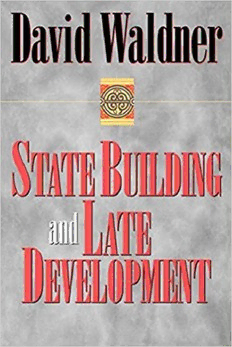Table Of ContentState Building and Late Development
State Building
and Late
Development
David Waldner
C
Cornell University Press
ITHACA AND LONDON
Copyright© 1999 by Cornell University
All rights reserved. Except for brief quotations in a review, this book, or parts thereof, must
not be reproduced in any form without permission in writing from the publisher. For
information, address Cornell University Press, Sage House, 512 East State Street, Ithaca,
New York 14850.
First published 1999 by Cornell University Press.
First printing, Cornell Paperbacks, 1999.
Printed in the United States of America
Cornell University Press strives to use environmentally responsible suppliers and materials
to the fullest extent possible in the publishing of its books. Such materials include
vegetable-based, low~VOC inks and acid-free papers that are recycled, totally chlorine-free,
or partly composed of nonwood fibers.
Library of Congress Cataloging-in-Publication Data
Waldner, David.
State building and late development I David Waldner.
p. em.
Includes bibliographical references and index.
ISBN 0-8014-3554-4 (cloth: alk. paper).-ISBN 0-8014-8575-4
(pbk. :k alk. paper)
1. State, The. 2. Syria-Politics and government. 3. Turkey
Politics and government. 4. Korea-Politics and government.
5. Taiwan-Politics and government. I. Title
JC13l.W36 1998
321 '.09172'40904-dc21 98-30402
Cloth printing 10 9 8 7 6 5 4 3 2
Paperback printing 10 9 8 7 6 5 4 3 2
Contents
Abbreviations vii
Acknowledgments ix
1. Institutional Origins and Economic Outcomes 1
2. State Building and the Origins of Institutional Profiles 19
3. Constructing Coalitions and Building States: Turkey 53
4. Constructing Coalitions and Building States: Syria 74
5. Precocious Keynesianism in Practice 95
6. Elite Cohesion and State Building in East Asia 125
7. The Collective Dilemmas of Late Development 153
8. The Developmental Consequences of Precocious Keynesianism 179
9. Pathways from Precocious Keynesian ism 208
10. Theory and Method Reconsidered 230
Index 241
Abbreviations
ANAP Motherland Party (Turkey)
DNP Democratic Nationalist Party (Korea)
DP Democratic Party (Turkey)
ELG export-led growth
FDI foreign direct investment
GDP gross domestic product
GNP gross national product
lSI import-substituting industrialization
JP Justice Party (Turkey)
KMT Kuomintang (Taiwan)
LS Syrian lira or pound
NSP National Salvation Party (Turkey)
RPP Republican People's Party (Turkey)
SEE State Economic Enterprise (Turkey)
SPO State Planning Office (Turkey)
TFF Turkish Federation of Farmers
TL Turkish lira
TOB Turkish Chambers of Commerce (Turkiye Odalar Birligi)
TUCA Turkish Union of Chambers of Agriculture
UAR United Arab Republic
vii
Acknowledgments
I
first began thinking about the political requirements of economic
development as an undergraduate in Yahya Sadowski's introduction to
comparative politics at the University of California, Berkeley, in 1984. I
thank him for introducing me to a topic that has engaged me so thor
oughly for so long. I have had the good fortune to spend the intervening
years in the company of friendly scholars and scholarly friends. At Berke
ley, KenJowitt, Robert Price, Kiren Chaudhry, and Ira Lapidus were a
wonderful source of intellectual inspiration and support. I thank Ilkay
Sunar for introducing me to Turkish politics, arguing with me about my
initial formulation of this study, and assisting me with my research in
Turkey. Many of the ideas presented in this book were first sharpened in
debate with the members of the seminar on state formation at the New
School for Social Research, especially Charles Tilly, Cannenza Gallo, and
Ariel Salzman. I also benefited from many stimulating conversations with
colleagues at the Middle East Institute at Columbia University, especially
Lisa Anderson, Greg Gause, Richard Bulliet, Henri Barkey, and Marty
Malin.
My thinking about social science, and thus about all the arguments
contained in this book, was indelibly influenced by years of intellectual
exchanges with my Berkeley friends and cohorts-Bob Bullock, Russ
Faeges, John Gerring, Steve Hanson, Peter Kingstone, Glenn Robinson,
and Arun Swamy. More directly, I benefited from the advice of Gerard
Alexander, Bob Bullock, and Herman Schwartz, who read and com
mented generously on successive drafts of this book. I am particularly in
debted to Sayres Rudy for so often lending me his amazing analytic and
editorial skills. I also thank Henri Barkey, Dale Copeland, Joshua Dien
stag, John Echeverri-Gent, Robert Fatton, Steve Heydemann, John
McLaren, Carol Mershon, Debra Morris, Soli Ozel, William Quandt, Len
ix

